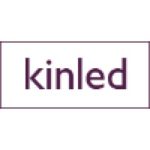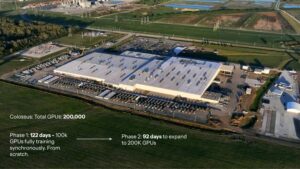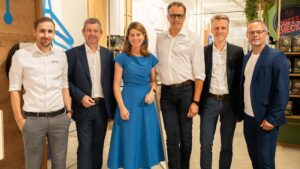AI is so Much More Than Just ChatGPT – and This Investor Proves it

Kinled is renowned as a life sciences and financial technology investor, with a portfolio of over 125 investments. Within their portfolio are nearly 50 companies specialised in cutting edge digital technology. The advent of AI has altered the investment strategy of Patrick Aisher, Chairman of Hong Kong-based Kinled Holding Limited, who has established a global investment network.
“Approximately 25% of our technology portfolio is directly involved in Artificial Intelligence applications”, says Aisher. “In reality, the use of massive computational power in life sciences and molecular drug discovery has been standard for many years, and this type of approach is now being applied to other industries. Kinled was an early investor in the first-ever FDA-approved AI diagnostic platform, and now has AI and machine-learning investments across multiple industries.”
In this article, Aisher provides an overview of its AI investments worldwide, ranging from health to computer vision to peacekeeping.
Othis: AI for Personal Wealth Management
Kinled has invested in Vienna-based Othis, which is on a mission to empower personal wealth management at a professional level using advanced technologies.This involves gaining a deep understanding of diversification in complex portfolios, which include both public and private assets. By integrating financial analytics tools with a variety of data sources and Large Language Models (LLMs), Othis aims to deliver fine-tuned, hyper-personalized portfolio recommendations at scale.
While the company is progressing towards realizing this vision, the current software helps individuals professionally and securely organize their assets using open finance and internally-trained LLMs.
Digital Diagnostics: AI to Prevent Blindness
Through its interest in a Boston-based medical technology fund, Kinled owns a participation in Digital Diagnostics. The company is a pioneering AI diagnostics company on a mission to benefit patients by transforming the accessibility, affordability, equity, and quality of global healthcare through the application of technology in the medical diagnosis and treatment process.
People with diabetes fear visual loss and blindness more than any other complication. Diabetic retinopathy (DR) is the primary cause of blindness and visual loss among working-age men and women in the United States and causes more than 24,000 people to lose vision each year. Adherence to regular eye examinations is necessary to diagnose DR at an early stage when it can be treated with the best prognosis and have resulted in substantial reductions in visual loss and blindness. In April 2018, Digital Diagnostics became the first company to ever receive FDA clearance for an AI diagnostic platform that makes a diagnosis without physician input at the point-of-care.
This achievement did not happen overnight – it was the culmination of decades of research by founder Dr. Michael Abramoff on automated image analysis, combined with decades of research on how clinicians diagnose disease. Digital Diagnostics has proven that intelligent diagnostic platforms can be deployed safely and responsibly to improve patient outcomes and increase healthcare productivity. Digital Diagnostics is in use at over 20 health systems and our customers have tested thousands of patients and identified hundreds of patients with disease who were previously undiagnosed.
Xapien: AI for Corporate Due Diligence
Mountain Labs is a Swiss technology incubator that Kinled has funded, which is also an investor in the D2 Fund in London, who have invested in Xapien. Xapien uses very sophisticated natural language processing and disambiguation models to surface hyper targeted information on individuals for due diligence purposes.
Xapien have built all of their technology from the ground up. Faces are one of the strongest indicators that two mentions across two webpages are indeed the same person, whether that’s a biography on a team page, a social profile or a photo of them in the news.
Xapien identifies every face in every image on every page and article they process. Fast neural networks extract the key features and match them across every other facial feature we have. Address data is one of the most inconsistently presented data types, but being able to match addresses can be critical. They have replicated this at global scale and their technology uses vast geospatial data sets and machine inference to resolve locations, in any script, anywhere in the world.
Senseye: AI for Mental Health Treatment
Kinled is investing in Senseye, an Austin, Texas based company that has developed a Machine Learning enabled platform deployed on mobile devices that measures nervous system activity via the eyes and returns a diagnostic and severity measurement signal. The company established a new and improved “Standard of Care” for mental health. “Over 70 million Americans suffer from Mental Health issues annually, and 59% do not receive medical care”, says Aisher. The patented AI system aims to become the world’s first full diagnostic & severity measurement platform for mental health.
The Senseye system has run clinical trials at UCLA and Harvard, and is now used by the Department of Defense to assess Anxiety and Post Traumatic Stress Disorder (PTSD) in returning military personnel. The system provides healthcare professionals accurate diagnoses for mental health conditions in 10 minutes on a mobile phone without the need for any patient self reporting or disclosures and then provide accurate objective monitoring of condition severity during treatment, thus enabling earlier more accurate treatment.
ReBio: AI for Drug Discovery
Kinled and MountainLabs are both shareholders in ReBio, a Finnish biotechnology firm, who uses computational methodologies in the compound selection process in drug discovery. One of the collaborators has developed a computational algorithm that can be used to predict the affinity of a given compound to bind to certain receptors that have an increased presence in the retina. They studied a few thousand compounds, running lots and lots of in vitro studies, and based on a variety of chemical characteristics, developed an algorithm to predict the retinal binding affinity of other compounds.
ReBio is using that algorithm to evaluate a subset of one class of therapeutic compounds and takes the best of these and conduct confirmatory in vitro evaluations before moving into formulation studies. Based on those results, the company decide what to take forward into animal studies. The ability to eliminate 97% of the compounds with a computer is of course a significant reduction in effort. ReBio has leveraged its drug-delivery system to create a new franchise to transform the standard of care in the treatment of vision-threatening chronic eye diseases.
Kinled & Mountain Labs: Der Fintech-Investor für Innovationen jenseits des Hypes
PreComb: AI to Fight Cancer Tumours
Kinled hold a direct stake in Swiss Federal Institute of Technology (ETH)-spin-off PreComb. The company systematically measures and categorizes the growth patterns of patient-derived microtumours in vitro in response to different drug treatments using cutting-edge machine learning techniques. By integrating sophisticated algorithms, the company is able to analyze volumetric changes and morphological variations of three-dimensional tumor models used to mimic the complex structure of tumors in vitro. The application of AI algorithms facilitates the identification of subtle growth dynamics and response patterns that may not be detectable by traditional analysis methods, ultimately providing more precise and targeted treatment regimens for cancer patients.
Axelera: AI for Computer Vision and Enhanced Processing Power
Kinled is a partner in Zurich-based Verve Venture Fund which invested in Axelera. The company’s 150-strong team is developing an end-to-end platform for edge AI starting with computer vision applications. Computer vision is the field of AI that trains computers to capture and interpret information from image and video data.
Their core innovation are the proprietary AI processing units (AIPUs), hardware accelerators designed for the edge. These chips are based on the principles of in-memory computing where the computation power is integrated into the RAM memory. This eliminates most of the power hungry and slow data movement and boosts the performance of neural networks. This type of architecture is often called ‘brain-inspired’ as the neurons in our brains function in a very similar way, being memory and computing nodes at the same time. This architecture is especially suitable for the implementation of neural networks that can process large streams of data such as images very quickly.
Axelera’s first product is the “Metis” platform. A digital in-memory computing chip that delivers large computing power at low energy cost paired with a powerful software stack that allows deployment by non-experts. This approach allows companies of all size to harness the power of AI, truly democratizing its use.
Timely: AI for Time Management and Invoicing
Kinled has a direct stake in Timely in Oslo, Norway, which has a smart system that automatically records your work activities across devices and apps. It tracks everything from your online meetings and computer tasks to where you go through your phone’s GPS. Timely is the world’s first AI-powered time tracking and planning tool.
Timely created a bespoke AI system that quickly learns which projects your activities belong to. For example, after you tell Timely a few times that your meetings with Concentric go under the “Concentric: Meetings” project, it will start to do this for you. All you need to do is click “Accept” to confirm. This means that the users don’t have to stress about remembering every detail of the day to fill out timesheets. Timely drafts them for them, which can save them hours every month and makes sure that timesheets, and the associated invoices connected to them, are accurate down to the minute.
DRUID: AI for Conversational User Experiences
Bucharest, Romania-based DRUID is helping businesses achieve more with generative AI and intelligent automation. Druid is a no-code Conversational AI platform that allows companies to design and deploy superior experiences for internal and external users using omnichannel interactions and business process automation.
Powered by a proprietary NLP/NLU engine that truly understands human language, advanced analytics, evaluation, and no-code UI tools, DRUID provides a conversational UX layer to any enterprise system, enabling a revolutionary new way of working – the Conversational Business Apps. Druid has raised $30M at a $100M valuation.
Shield AI: AI for Peacekeeping
Kinled is a minority shareholder in San Diego-based Shield AI which believes that AI pilots will revolutionize battlefields and commercial aviation at a scale greater than the self-driving movement reshaping our highways. Hivemind, their AI pilot, enables swarms of drones and aircraft to operate autonomously without GPS, communications, or a pilot. Their mission is to protect service members and civilians with intelligent systems.
As a Navy SEAL, Shield AI co-founder Brandon Tseng experienced firsthand problems where intelligent autonomy could have made life-saving differences. He asked himself what does the military of 2030 look like and what role does autonomy play. The answer – AI pilots powering every military asset: aircraft, drones, ships, satellites and submarines. Shield AI plans to build the aerospace and defense technology company of the 21st century focused on AI pilots, and has just completed a $200M Series C financing at a $2B valuation.
Conclusion
Along with other renowned family offices, Kinled are significant investors in Vienna-based Calm/Storm Ventures second digital health fund, who are putting a particular emphasis on embracing the AI revolution in healthcare. The integration of AI technologies in healthcare signifies a paradigm shift, driven by the demand for accurate diagnostics, personalized treatment plans, and optimized healthcare processes.
The fund has invested in companies such as Healthforce, Medwise, Kiroku and Adent Health, and a Norwegian healthtech company that is founded by the former Head of AI of Healthtech giant Babylon Health.
Kinled’s Chairman Patrick Aisher has also established DanubeNeuro, a specialized fund that is focused on Neurodegeneration and Longevity solutions. “Many of the opportunities we see in this space are using advanced machine learning and AI as a core component of their research and product development”, says Aisher. “We are confident that this is fast becoming the norm- and strongly believe that it will be almost impossible for technology firms to exist and grow without a clear AI strategy in the future. The profound impact of artificial intelligence on technology and its future is undeniable.”




























